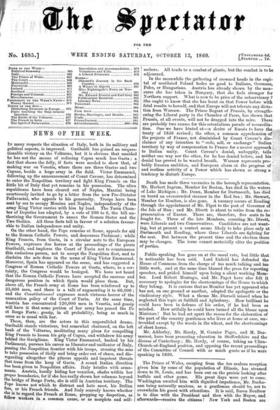NEWS OF THE WEEK.
Ire many respects the situation of Italy, both in its military and political aspects, is improved. Garibaldi has gained an unques-
tionable victory on the Volturno, but it is obvious that unaided he has not the means of reducing Capua much less Gaeta ; a fact that shows the folly, if facts were needed to show that, of making war on Venetia, where there are three Gaetas and two Capuas, beside a huge army in the field. Victor Emmanuel, following up the announcement of Count Cavour, has determined to enter the Neapolitan territory and fight King Francis on the little bit of Italy that yet remains in his possession. The ultra republicans have been cleared out of Naples, Mazzini being courteously invited to go by a letter from the new Pro-Dictator Pallavaeini, who appeals to his generosity. Troops have been sent by sea to occupy Messina and Naples, independently of the army King Victor carries with him by land. The Turin Cham- ber of Deputies has adopted, by a vote of 290 to 6, the bill au- thorizing the Government to annex the Roman States and the Two Sicilies. All these facts tell in favour of a solution favour- able to Italian independence and unity.
On the other hand, the Pope remains at Rome appeals for aid' to the Roman Catholic Powers, and denounces Piedmont ; while King Francis, from Gaeta, in a circular note to the European Powers, expresses due horror at the proceedings of the pirate Garibaldi, and implores the Court of Turin not to countenance this audacious person, not to accept the Neapolitan fleet, and to disclaim the acts done in the name of King Victor Emmanuel. Moreover, Spain has appeared on the scene, and has suggested a Congress of Roman Catholic Powers at Gaeta, where, to a cer- tainty, the Congress would be besieged. We have not heard that the Roman Catholic Powers have accepted the onerous and dangerous position in which Spain would place them. But, above all, the French army at Rome has been reinforced up to 25,000 men, and there is a talk of augmenting it to 60,000; and the Constitutionnel expresses much virtuous horror of the annexation policy of the Court of Turin. At the same time, Austria has concentrated 120,000 men in Venetia, and gossip will have it that some portion of her army has passed the Po at Borgo Forte ; gossip, in all probability, being as much in error as is usual with her.
These then, are the actors in this unparalleled drama. Garibaldi stands victorious, but somewhat shattered, on the left bank of the Volturno' meditating many plans for compelling King Francis to loosen his grip of Capua, and withdrew his army behind the Garigliano. King Victor Emmanuel, backed by his Parliament, pursues his career as liberator and unificator of Italy, passing the Neapolitan frontier with his troops, crossing the seas to take possession of Sicily and bring order out of chaos, and dis- regarding altogether the piteous appeals and impotent threats that issue from the keep of Gaeta. A sound Italian direction has been given to Neapolitan affairs. Italy bristles with arma- ments. Austria, hardly hiding her vexation, chafes within her proper boundaries, for if she has really shown her columns beyond the bridge of Borgo Forte, she is still in Austrian territory. The Pope knows not which to distrust and bate most, his Italian foes, or his French friends. And Italy scarcely knows whether she in to regard the French at Rome, propping up despotism, as fellow workers in a common cause, or as marplots and self-
seekers. All tends to a combat of giants, but the combat is to be adjourned.
In the meanwhile the gathering of crowned heads in the capi- tal of mutilated Poland bodes no good to Italians, Germans, Poles, or Hungarians. Austria has already shown by the mea- sures she has taken in Hungary, that she feels stronger for Northern support. What is now to be price of the subserviency ? She ought to know that she has leant on that Power before with fatal results to herself, and that Europe will not tolerate any dicta- tion from Warsaw. The Prince Regent of Prussia, by strength- ening the Liberal party in the Chamber of Peers, has shown that Prussia, at all events, will not be dragged into the mire. There are probably two causes for this ostentatious parade of reconcilia- tion. One we have hinted at—a desire of Russia to have the treaty of 1856 revised ; the other, a common apprehension of the projects of France, not diminished by Count Cavour's dis- claimer of any intention to "cede, sell, or exchange" Italian territory by way of compensation to France for a nearer approach to Italian unity. Count Cavour's denial, unhappily, tells neither one way nor the other, for he has denied before, and his denial has proved to be wasted breath. Warsaw represents pro- bably Russian ambition, and European alarm at the progress of and restless activity of a Power which has shown so strong a tendency to disturb Europe.


























